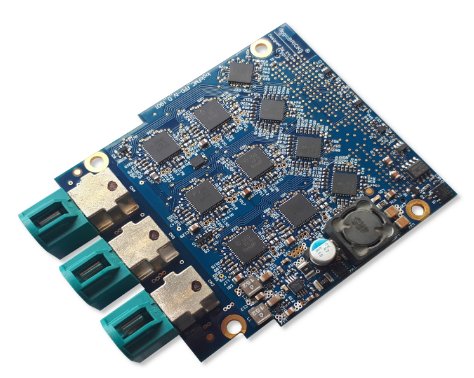Xylon Expands Its Offer of FMC Expansion Boards Featuring High-Speed Serial Links for FPGA Based Multi-Camera Automotive Application Development
Xylon’s FMC expansion boards provide the most popular automotive high-speed serial links to enable easy interfacing of up to twelve video cameras to Xilinx FPGA and SoC based video and vision processors for multi-camera Advanced Driver Assistance System (ADAS) and Autonomous Driving (AD)
April 14, 2020, Zagreb (Croatia) – Xylon, a leading provider of logicBRICKS intellectual property (IP) cores, design services and solutions for Xilinx, Inc. (NASDAQ: XLNX) All Programmable FPGA and SoC devices, today expanded its offer of FMC expansion boards that support the most popular TI and Maxim Integrated standards.

logiFMC-FPD3-954 12-Ch FPD-Link III FMC Daughter Card
The logiFMC-FPD3-954 12-Channel FPD-Link™ III expansion board implements six (6) TI DS90UB954-Q1 deserializers that pair with counterpart DS90UB953-Q1, DS90UB935-Q1, DS90UB933-Q1 and DS90UB913A-Q1 serializers from Texas Instruments. It is primarily designed to enable quick prototyping and evaluation of automotive multi-camera Advanced Driver Assistance (ADAS) and Autonomous Driving (AD) applications, but can also be used in a variety of different non-automotive camera applications. The logiFMC-FPD3-954 FMC board enables easy interfacing of up to twelve video cameras to Xilinx FPGA, SoC, and MPSoC devices.
Xylon’s logiFMC-FPD3-954 board is assembled with the Rosenberger® quad HFM® High-Speed FAKRA-mini connectors that save installation space and enable four coax cable video connections per connector.
FPGA Mezzanine Cards (FMC) expansion boards from Xylon are compliant with the VITA 57.1 FMC standard, and can be used with high pin count (HPC), as well as low pin count (LPC) connectors. They can be used with the existing Xilinx programmable device based evaluation kits with the FMC connector, such as Xilinx® Zynq® UltraScale+™ MPSoC ZCU102/ZCU104/ZCU106 evaluation kits, DRIVE-XA Automated Driving Development Platform or other Xilinx and third-party evaluation boards.
The logiFMC-FPD3-954 FMC expansion board is now available through Xylon: https://www.logicbricks.com/Products/logiFMC-FPD3-954.aspx
Get the full datasheet: https://www.logicbricks.com/Documentation/Datasheets/HW/logiFMC-FPD3-954_hds.pdf
About Xylon
Xylon is an electronics company focused on design of optimized logicBRICKS IP cores for Xilinx All Programmable devices and design services that lower production costs and improve efficiency of electronics designers. The company was founded in 1995, and has since then grown into a prominent provider of intellectual property in the fields of embedded graphics, video and vision. Xylon is a Premier Member of the Xilinx Alliance Program. More information can be found at www.logicbricks.com, the official Xylon web site.
Related Semiconductor IP
- JESD204E Controller IP
- eUSB2V2.0 Controller + PHY IP
- I/O Library with LVDS in SkyWater 90nm
- 50G PON LDPC Encoder/Decoder
- UALink Controller
Related News
- Xylon's logiSDHC SD Card Controller IP core now includes the File System
- Xylon Releases the Reference logicBRICKS Graphics Processing Unit (GPU) Design for Xilinx Zynq-7000 AP SoC based inrevium Extension Microcontroller Card from Tokyo Electron Device, Ltd.
- ReFLEX CES Attila Arria 10 FPGA FMC Instant-DevKit added to Arrow Electronics Line Card
- CAST Expands CAN Bus Solutions Suite with New PHY Daughter Card
Latest News
- SmartDV and Mirabilis Design Announce Strategic Collaboration for System-Level Modeling of SmartDV IP
- GUC Monthly Sales Report – January 2026
- IBM, Synopsys Move Toward 1.4-nm Node with Heat-Modeling Tech
- UMC Reports Sales for January 2026
- Arm delivers fourth consecutive billion-dollar revenue quarter, extending record-breaking momentum